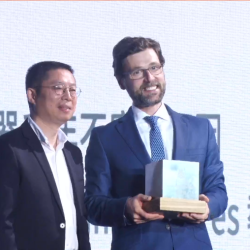

Research by a collaborative team of UK-based and Chinese researchers has been awarded the prestigious Pineapple Science Award in Chemistry.
Now in their eighth year, the Pineapple Science Awards are given by the Zhejiang Association for Science and Technology to “imaginative, unexpected and far-reaching scientific achievements” published in high-impact scientific journals. Under the banner of “admiring curiosity”, the award ceremony took place last month at the Zhejiang Science and Technology Museum during the World Young Scientists Summit, which brought thousands of scientists to the city, including several Nobel Prize laureates and other leading researchers.
The publication highlighted in the Chemistry category was published earlier this year in Nature Scientific Reports. In this paper, lead author Marcos Martinón-Torres from the University of Cambridge and a team from UCL and Emperor Qin Shihuang’s Mausoleum Site Museum, demonstrated that the chromium “coating” on the bronze weapons buried with the Chinese Terracotta Army, once thought to be the earliest form of anti-rust technology, in fact derived from lacquer used to decorate the warriors and weapon parts.
The research showed that the chemical composition and characteristics of the surrounding soil, rather than chromium, explained metal preservation as an unintended phenomenon.
Prof Martinón-Torres said: “I am honoured to collect this award on behalf of a large team of Chinese and Western scholars, as a recognition of the success of our long-standing collaboration. I am delighted to celebrate curiosity as the starting point of scientific discoveries, and very much welcome an award that remembers that science is not always a straight path. You need to be prepared to follow unknown paths if you want to discover the unknown, and archaeology is a great example of how the best of science and humanities can be brought together”

Pineapple Science Awards in other categories included projects from MIT, Stanford, Peking University and the University of Helsinki, among others, with research on what happens on the human brain when walking and using mobile phones, why the tongues of cats are so effective at cleaning, the fluid dynamics of cracking knuckles, or the relationship between holidays and happiness.


